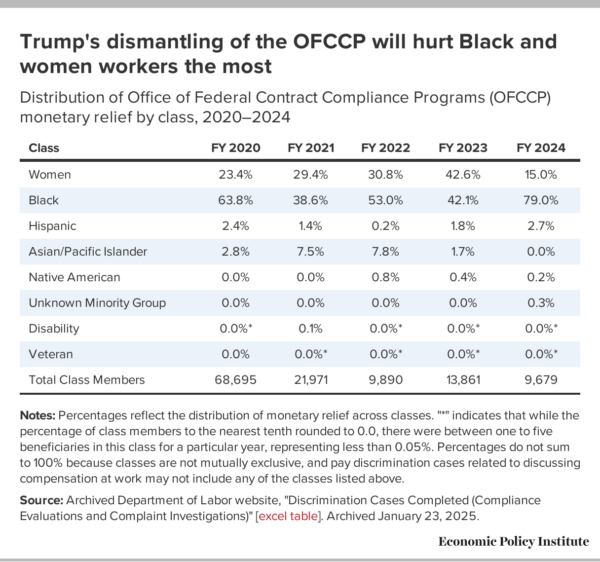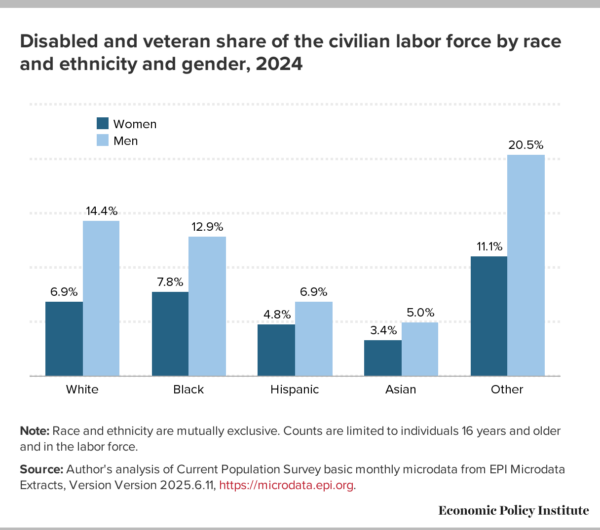Since returning to office, the Trump administration has gutted the Office of Federal Contract Compliance Programs (OFCCP)—which has long ensured that employers conducting business with the federal government comply with equal employment opportunity laws. This has made equal employment laws effectively unenforceable for the entire civilian federal contracting workforce.
What’s happening?
In January, President Trump issued Executive Order (EO) 14173 that drastically cut OFCCP’s enforcement oversight and ended affirmative action requirements for federal contractors established by President Lyndon B. Johnson in 1965. In a total about-face from six decades of leveraging the purchasing power of the federal government to encourage private-sector employers to adopt more equitable employment practices and establish written affirmative action programs for women and minorities, Trump’s executive order explicitly discourages any efforts to remedy racialized or gendered patterns of discrimination in employment or pay. Instead, it derisively and inaccurately labels such efforts as “DEI-based discrimination”, implying that they result in workers of color and women unfairly displacing more qualified (assumptively white male) candidates.
Recently, the agency proposed regulations to further unwind its own work and authority. One of the proposed rules would formally rescind the regulations implementing President Johnson’s original EO to establish the agency’s existence and authority. Another would risk weakening data collection on whether federal contractors are meeting “utilization goals”—benchmarks for evaluating the representation of people with disabilities in the federal contracting workforce. These actions showcase the Trump administration’s embrace of Project 2025’s anti-worker and anti-equity agenda, which included a policy proposal to eliminate OFCCP.
Trump’s 2026 budget formally requests Congress to defund OFCCP’s operations. If Congress were to agree to zero out OFCCP’s budget—and if the regulatory unwinding of the agency’s primary mandate proceeds without obstacles—there would no longer be any federal agency dedicated to ensuring that federal contractors operate fair, nondiscriminatory workplaces. In other words, taxpayer dollars could essentially subsidize persistent discrimination. Under the Trump administration’s plans, OFCCP’s remaining legal responsibilities to enforce equal employment opportunity for certain veterans and for workers with disabilities would shift over to the Department of Labor’s (DOL) Veterans Employment and Training Service (VETS) or to the Equal Employment Opportunities Commission (EEOC)—agencies with different mandates and areas of expertise than the federal contracting workforce.
In one promising sign, fortunately, the Senate Appropriations Committee recently voted to advance a bipartisan funding proposal that rejected the Trump administration’s request to zero out OFCCP’s budget. It remains to be seen how appropriators in the House or the Trump administration will respond.
Shuttering the OFCCP will hurt Black and women workers the most
As a relatively small DOL division, OFCCP’s work has gone largely unnoticed by the broader public even though it has achieved important results for workers. According to historical data that the Trump administration removed from the OFCCP website, OFCCP conducted reviews at contractor sites employing over 10.3 million workers between 2014 and 2024. OFCCP investigations resulted in 250,900 workers obtaining financial relief totaling $260.8 million during that period—and over 22,600 individuals employed by federal contractors received new job opportunities or salary adjustments.
Table 1 presents historical monetary relief data by class, revealing the groups most likely to be harmed by Trump’s actions. Black workers and women received most of the monetary relief resulting from OFCCP investigations between 2020 and 2024, demonstrating just how targeted the impact of Trump’s executive order will be.
Stripped of its authority and with only minimal staff remaining, OFCCP’s only remaining equal employment compliance oversight is for disabled workers under Section 503 of the Rehabilitation Act (Section 3) and protected veterans under the Vietnam Era Veterans’ Readjustment Assistance Act (VEVRAA). However, as Table 1 shows, no more than 0.1% of monetary relief resulting from OFCCP investigations over the past five years was awarded based on disability or veteran status.

While there are no public data on the demographic composition of workers employed by federal contractors, current labor force demographics illustrate the potential magnitude of those changes. Figure A shows the share of the labor force by race, ethnicity, and gender that is either disabled or a veteran. Among Black workers—the largest share of monetary relief recipients—less than 8% of Black women and 13% of Black men would be eligible for monetary relief based on disability or veteran status alone. Across all racial groups, a smaller share of women than men would remain eligible.

According to the U.S. Government Accountability Office, the federal government obligated $755.1 billion through contracts in 2024 to procure products and services ranging from aircraft and software to health care and engineering support. The planned elimination of OFCCP represents the Trump administration’s surrender of this tremendous federal leverage to enforce nondiscrimination compliance among private-sector employers. It is also a major shirking of the federal government’s responsibility to demand accountability from businesses who profit from billions in taxpayer dollars, including tax dollars paid by people they now have a lot less obligation to employ and pay fairly. This would be a clear retreat from the principles of economic, racial, and gender justice which are the basis for equal rights and full participation in our society. The American people deserve better.


